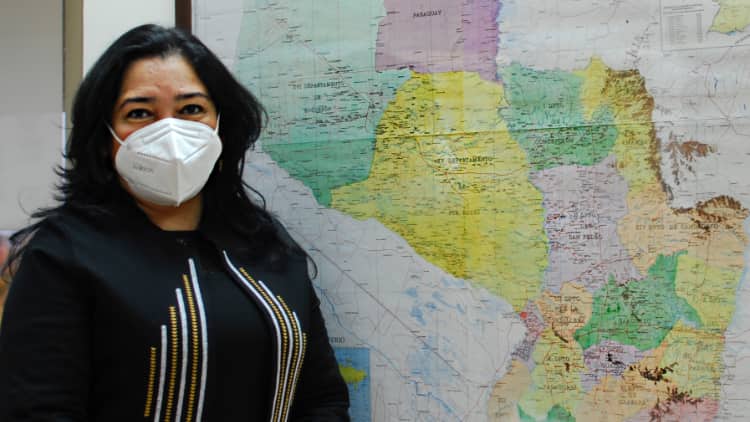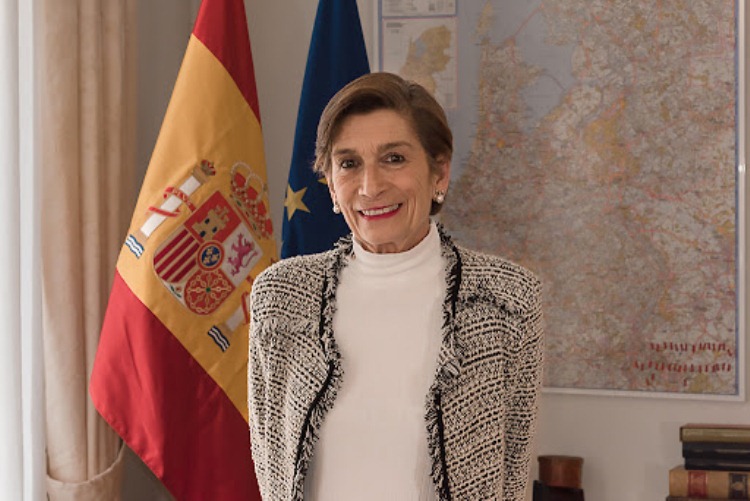Sofia Montiel de Afara
Minister of Tourism of Paraguay
Alberto Rubio
She has had to deal with a tough pandemic, precisely when Paraguay was in the midst of a tourism expansion process. Nevertheless, Sofía Montiel de Afara is cautiously optimistic. She has been a civil servant in the Ministry of Tourism since 1990 and three years ago she was given the responsibility of being “the minister of the house”.
Paraguay has made a remarkable effort to promote its tourism, but Covid has stood in the way.
All the actions taken before the pandemic were on the right track. Today we are restarting what we hope will be a sustained reactivation both domestically, because we are having a significant movement of domestic tourists, and in the recovery of international tourists, since connectivity has been reactivated with all the companies that operated before the pandemic.
In the case of Spain, are the current flights sufficient?
At present, only one Spanish airline has four direct flights a week to Paraguay. Now it will increase to five and in April we hope to have six flights. The interest is there, there are customers and the flights are full. We hope that other companies will join in.
Where are you getting more tourists from now?
We are receiving mostly Brazilians, Argentinians, Bolivians, Germans, North Americans and Spaniards, in that order. I want to emphasise that we have had a steady growth in international visitors, many of them coming for investment, corporate and leisure tourism. Before the pandemic we had 1.2 million visitors who generated 489 million dollars in foreign exchange earnings. And we have to add three million excursionists, who are those who come to our border cities for work but do not stay overnight.
Before the pandemic, the movement related to corporate meetings, congresses, conventions and sporting events increased by 51%, which allowed us to earn more than 174 million dollars that year. Paraguay is currently hosting important world and South American sporting events despite the pandemic. This gives us an economic oxygenation of sectors that are part of the value chain, such as accommodation, transport, etc.
What value do you give to your ‘Orange Tourism’ initiative?
For Paraguay it is very important because the large number of young people we have forces us to work on programmes generated especially for them. This programme, which we have been working on for a decade, has resulted in the generation of innovative and creative tourist circuits. And, thanks to this, thousands of young people have stopped migrating from their villages to the cities. This economic dynamic has benefited the entire value chain.
How did you do it?
We implemented scholarships for young people abroad on condition that they apply their knowledge in their villages. By including young people from ancestral communities, we managed to get them to be guides at historical sites such as the Jesuit Communities. They are the main spokespersons for our heritage. They feel empowered by this activity and have a strong commitment to show the best that our country has to offer with our most human face.
Haven’t you thought about attracting young tourists from abroad?
Absolutely. We receive young people from many countries around the world. There are many who spend their gap year here and then don’t want to come back. We have experiences of young people from Asia who have stayed to live in Paraguay because they feel at home. As our slogan says, ‘Paraguay, just for you’, we have a country designed for you to enjoy.
There is another important programme that I would like to highlight, in which women are the protagonists. It is the Posadas Turísticas. The project began with separated or widowed women who were left on their own, and by providing gastronomy and attention, they were located in areas where there were no hotel services. We now have 280 tourist inns throughout the country. Ninety-five per cent of the owners are women and they have generated such an important network that their children and husbands now work in their business.
Both programmes have been so successful that other countries ask us to share the experience. Because the change that has taken place is very visible.
Your country has history, culture, gastronomy, nature… What do you need to take off in the international tourism market?
To continue working on strong international coordination. We need to find partners to help us improve promotion. We are doing this through our consulates, with strong support from the Foreign Ministry. And to this end, the Ministry of Tourism has launched training campaigns so that diplomats abroad can present these tourism options.
Do you see a brighter future in the short term?
Paraguay has the ‘safe travel’ seal of approval, because we have taken sanitary measures very seriously. We want to gain the trust of international visitors. And we hope that the gradual opening of borders will continue, as well as vaccination, at a global level. That will allow us to revive ourselves in a sustained way.







